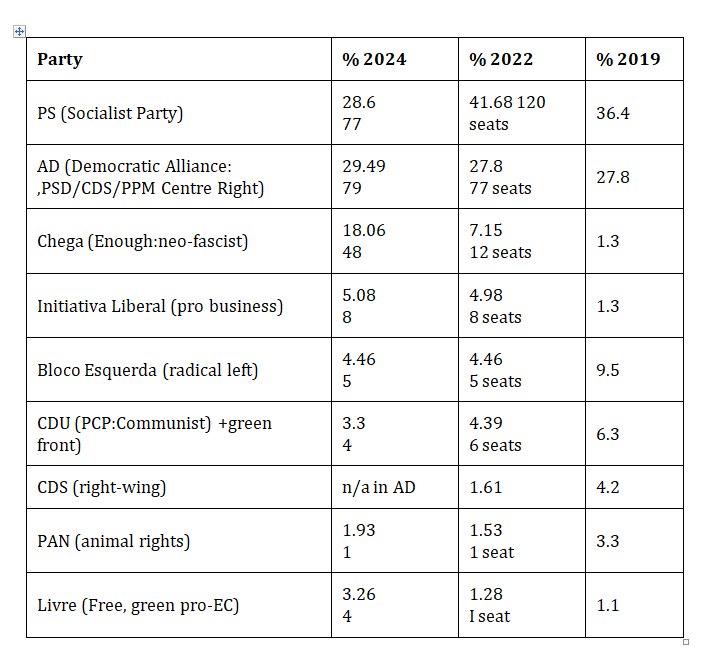Portugal Election – Far Right Surges
First results

Chega [Enough!], the far-right party led by ex-TV football pundit Andre Ventura, was the big winner of the night, increasing its votes by over ten points but quadrupling its seats to 48. It now competes as the third major party, way ahead of the rest of the field. The biggest loser is the PS [Socialist Party] which led the last two governments; it lost 13% of its vote and 43 seats. On the other hand, due mostly to the rise of Chega, the mainstream right of centre alliance, the AD (Democratic Alliance), which had been the main parliamentary opposition, only edged up by barely two points, with just two more seats. Even this small advantage could be altered once the overseas votes are counted. The pro-business, neo-liberal IL (Liberal Initiative) held on to its 8 seats.
To the left of the PS Livre (Free) a pro-European Greenish party nearly tripled its vote and went from one to four seats. The radical left Bloco Esquerda held on to exactly its last score and keeps its 5 MPs. However the PCP (Communist) lost a percentage point and two seats.
Government
Soon after the first projections, when the AD advantage was bigger, the PS representative accepted that the AD should form the government and they would go into opposition. The margin is wafer-thin although the previous governing party has clearly lost the most support. It is likely that the President will ask the AD to try and form a government.
Luis Montenegro has ruled out a government coalition with Chega even though the numbers are there. He has said that “no means no”, and has dubbed Ventura’s views as “xenophobic, racist, populist and excessively demagogic.” Probably the neo-liberal IL would join an AD government but their seats do not take the AD past 116 required. A lot depends on the PS sticking to its early position, already signposted in the campaign, that it would allow a minority AD government to be established. In that eventuality PS abstentions would mean AD would not require Chega votes to form a government. Given the final figures the PS could demand some political concessions or red lines from an AD government and perhaps anticipate new elections at some point. Certainly if the PS were not to be accommodating then the AD could change its position on an alliance with Chega.

The Right
Chega, with a fifth of the seats, now has a substantial political and material basis for further growth. Ventura has consistently says he wants to form a government with the AD. Unlike in Italy there was no pre-election coalition between his party and the AD. Ventura repeatedly declares he is not neo-fascist or far right. He originally was an activist in the PSD, the main party of the AD. His main campaign slogan was to “Clean up Portugal.” He railed against the two party caste that has ruled Portugal for 50 years since the end of the dictatorship.
The Costa government fell because of corruption in his leadership group. It has been prevalent for many years. I remember going on a tennis holiday in the Algarve and discovered that the huge hotel and golf complex development there had involved bribes and kickbacks for politicians. So a campaign centred on kicking out the corrupt caste has proved effective.
Ventura outlined a whole raft of new laws and actions to weed out corruption – seizing assets, defining a new crime of illicit enrichment. AD failed to capitalise on the PS government failure to deal with low wages, declining health services and soaring housing cross because it was seen as a co-manager of a corrupt system. The previous right-led government had carried out hard austerity policies. Chega appears to have taken votes from both the AD and the PS.
The other part of Ventura’s clean-up is his racist offensive against immigrants and the Roma community. He proposes restricting immigration and creating a new crime of illegal residence. Over recent decades Portugal has gone from a country of net emigration to net immigration. Around 13% of the population come from migrant backgrounds. 70% of the population identify as White.
Chega also defends what it calls the traditional family and attacks women and LBGTQ+ rights.
If you combine this reality with the problems of inequality and austerity and the inadequate response of any governments to deal with these issues then you can see how Chega is able to blame migrants for the cost of living crisis or lack of housing. Chega’s big advance has taken place under the second PS government which has not continued some of the progressive policies it enacted during his first government when the radical left parties, the Bloco and the PCP had enabled its formation on condition it carried out such a programme.
Today being excluded from government could provide the conditions for Chega to further grow. An AD government permitted to govern by the PS would provide further confirmation of its claim that the two party system is a stitch up against the people. If there were to be a more formal programmatic agreement that could create an even greater opening. The AD might still want Chega votes to pass legislation if the PS opposes specific laws. Ventura has said he has contacts with PSD people and one tactic will be to step up pressure on their MPs to be more open to an agreement with Chega. We are seeing this scenario of far right parties pulling mainstream right parties to more extreme positions or working to create internal splits elsewhere in Europe.
Chega has important financial supporters. During the campaign the Civic Front exposed how it relied more on unnamed private backers than the official state funds for political parties. The Chega surge is part of the general rise of the far right or neo fascists in Europe and globally. This “creeping fascism” is pulling the mainstream right-of-centre parties to more extreme policies too. Already, leaders of Vox, the Spanish state neo-fascists and other far right leaders in Europe are sending in their congratulations to Ventura.
Bloco
The Bloco campaign focussed on putting forward radical measures on wages, health and housing as well as defending migrants, women and LGBTQ+ rights and calling on solidarity with Palestine. Unlike the PCP it has managed to maintain its electoral support and five seats. It also campaigned to stop the rise of Chega and a right wing government by proposing a new left wing agreement similar to the first Costa government. where it would give limited external support without taking ministerial posts. Clearly the failure to increase its support and the PS defeat meant this option is off the table. In this respect, the left as a whole has been pushed back in these elections.
In her first reaction to the results, Bloco leader Joana Mortágua, who was re-elected in Setúbal, said that they “confirm a shift to the right”, as a result of a “negative assessment, which we share, of how a PS government with an absolute majority delivered.” As for the Bloco’s result, by keeping the parliamentary group and increasing the vote compared to 2022, “it’s a sign that there’s confidence in the Bloco for whatever the political situation: whether it’s to form a majority or to be a determined and fierce opposition to the right.”
Livre (Free) a pro-European party with green credentials was the winner among the left-of-centre parties, tripling its vote and going from one to four MPs. Perhaps it is one reason why the Bloco did not succeed in significantly increasing its vote. It wins votes in the big urban areas and among similar demographics as the Bloco.
Austerity
Portugal remains one of the poorest and unequal countries in Europe, it is 24th in the Social Justice index in the EU. It has the world’s fourth highest number of citizens over 65 years, 21.8% of the population. Recent governments have not protected the living standards of senior citizens. Rental costs have soared for ordinary people. One factor is the uncontrolled promotion of tourism means an explosion of Airbnb lets in cities like Lisbon and Porto which increases rental values. The gains of a national health service set up after the revolution 50 years ago have been very much eroded.
Now that even the social liberal left are out of power, defending social gains and the living standards of working people will need increased mobilisations in the workplaces and communities. increased polarisation and instability could increase rather than decrease with these election results.
Republished from Anti*Capitalist Resistance: https://anticapitalistresistance.org/portugal-election-far-right-surges/
Bloco promises to be “the most combative opposition to the right”
The Left Bloc coordinator’s reaction to the results of the legislative elections came at a time when “the parliamentary situation is still not entirely clear”, given the close result between the PS and PSD that could be altered by the emigration votes.
Mariana Mortágua said that the shift to the right resulting from this Sunday’s elections “is a reflection of the failure of two years of disastrous politics by the PS’s absolute majority”.
LEGISLATIVE ELECTIONS RESULT IN A SHIFT TO THE RIGHT
But despite this shift, she emphasized that “the Bloc resisted and increased its votes by around 30,000. It stood firm in these elections, we kept all our seats”. And it is with this strength that “we will be part of any solution that removes the right from government,” she continued.
In this election, the Bloc re-elected two MPs in Lisbon (Mariana Mortágua and Fabian Figueiredo) and Porto (Marisa Matias and José Soeiro) and re-elected Joana Mortágua in Setúbal.
“I want the people of the left to know that they will have in the Bloc the most combative opposition to the right,” said the Bloc coordinator, promising to contribute to “building an alternative to the left to defend our people”.
11 March 2024
Republished from International Viewpoint: https://internationalviewpoint.org/spip.php?article8445
Translated by International Viewpoint from Esquerda Net->https://www.esquerda.net/artigo/bloco-promete-fazer-oposicao-mais-combativa-direita/90138].
Main photo: https://www.bloco.org/
